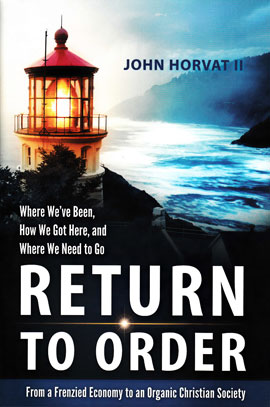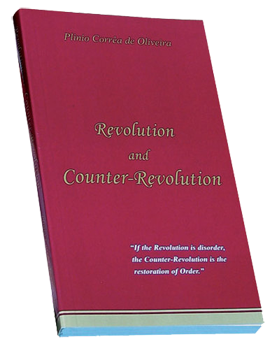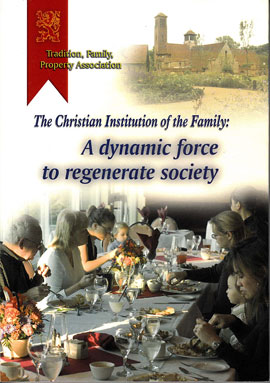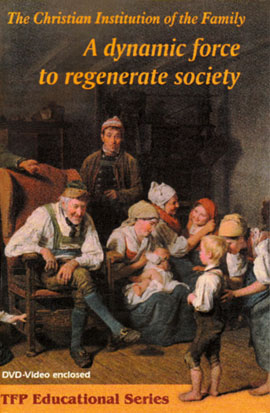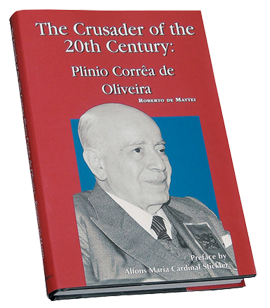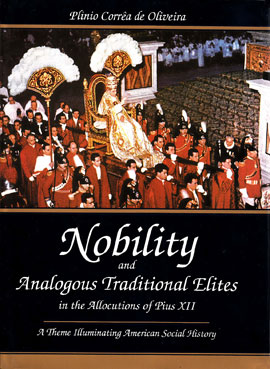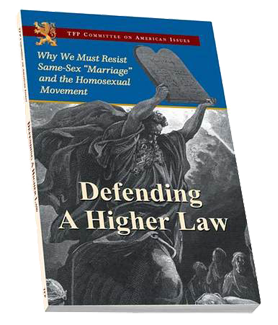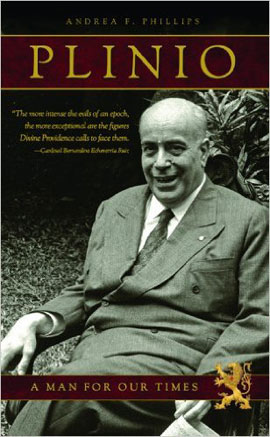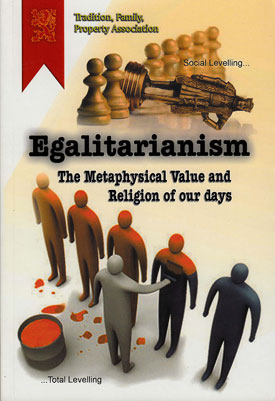Return to Order
From a frenzied economy to organic Christian society
by John Horvat
This ground-breaking book exposes a deep moral and psychological malaise that has disastrously impacted all areas of society. While the author focuses primarily on economics, he points out that the malaise has also devastated social life, undermined the family, and gnawed at the very soul of the human person. Solutions proposed for a wide range of problems by economists, sociologists and politicians (both Left and Right) have not taken into account this underlying malaise, and so do more to aggravate those problems than solve them. Mr Horvat argues that we will never escape the endless crises of the modern world without a radical rethink of our received wisdom about economics and society. Mr Horvat’s solution leaves the reader intrigued, uplifted, and even hopeful.
Hardback. 381 pages. Illustrated. $30
Price includes GST and postage to anywhere in Australia.
Overseas buyers, please contact us.
Revolution and
Counter-Revolution
Counter-Revolution
by Plinio Corrêa de Oliveira
A characteristic of our age is an all-pervading sense of disorder. Plinio Corrêa de Oliveira explains that this disorder stems from a great crisis he calls ‘the Revolution’. The Revolution (with a capital R) is an immense on-going crisis spanning the last five centuries. It effects every aspect of human life. It has identifiable and distinct stages.
The roots of this crisis are found in the moral decay of late Medieval Christendom. It deepens in the early modern age; it worsens in the eighteenth century and coalesces into the French revolution, which sweeps away Christendom altogether. In turn, the French revolution morphs into socialism. But since this is a process, and socialism is but one of its stages, the process will not stop with socialism. So we must ask where will it take us next? And, above all, what will be its final outcome?
The author doesn’t shrink from these all-important questions. He explains that if we understand the Revolution, its driving force, its strengths and weaknesses, we can halt it. If there is a single book that can help us to make sense of the prevailing post-modern disorder, this is it.
Hardback. 180 pages. $25
Price includes GST and postage to anywhere in Australia.
Overseas buyers, please contact us.
The Christian Institution
of the Family
A dynamic force to regenerate society
of the Family
by Philip Moran Jr.
The institution of the family is the origin and leaven of human existence. It is an essential prerequisite of progress. It is the very breath of life of the future! But for decades is has been under siege and undermined in every way. As a result, society spirals increasingly into chaos. If you want to know how this happened – and want to know what to do about it – this book is for you. This beautifully illustrated little volume packs a lot between its covers. It will give you a background historical perspective on the roll of the family as a bulwark against chaos and anarchy; it will show you some of the main reasons why families struggle today and how they are being undermined; more importantly, it will show you how the family can be a positive force to regenerate our society and make it truly Christian.
Paperback. 120 pages. Illustrated. $25
Price includes GST and postage to anywhere in Australia.
Overseas buyers, please contact us.
The Christian Institution
of the Family – DVD version
of the Family – DVD version
50 minutes. Dolby digital. $15
Price includes GST and postage to anywhere in Australia.
Overseas buyers, please contact us.
The Crusader
of the 20th Century
A Biography of Plinio Corrêa de Oliveira
of the 20th Century
by Roberto de Mattei
Those privileged to have known ‘Senhor Doutor Plinio’ will remember him as an inspiring leader, a man of deep piety, and above all as a warm-hearted friend. His life spanned most of the twentieth century. He witnessed the profound changes that swept Latin American during these turbulent decades and took an active part in the great debates that accompanied those changes. In public and private life, Corrêa de Oliveira kept his ideals always intact and never compromised his principals. He never swerved from the commitment he made while still very young to defend all that was traditional, Christian and good in Brazil.
Yet his place history goes beyond his native land. His contribution to the field of Catholic social thinking will have repercussion into the future. The worldwide movement bearing the name of TFP carries on the work to which he dedicated his life. Italian Professor Roberto de Mattei knew him well and travelled many times to Brazil to interview him. De Mattei’s challenge was to synthesise the thinking of a great mind in a relatively short biography and to locate this thinking in the lineage of distinguished ultra-montanist and counter-revolutionary thinkers.
Cardinal Alfons Stickler writes in his introduction to this biography: “With the integrity of his life as an authentic Catholic, Plinio Corrêa de Oliveira offers us a confirmation of the Church’s continuing fecundity. The difficulties of these times for true Catholics are, in fact, occasions to influence history by affirming perennial Christian principles. Such was the case with Professor Plinio, the eminent Brazilian thinker who demonstrated it by boldly maintaining his unshakable faith, during an age of totalitarianism of every stripe and colour, in the fundamental teachings and institutions of the Church.”
Hardback. 278 pages. Illustrated. $25
Price includes GST and postage to anywhere in Australia.
Overseas buyers, please contact us.
Nobility
and
Analogous Traditional Elites
in the Allocutions of Pius XII
by Plinio Corrêa de Oliveira
Since the eighteenth century, generations have been schooled in the utopian belief that a classless society is the only guarantor of liberty and justice for all. In order to achieve this, many thinkers supported the belief that perpetual conflict between classes is inevitable and even desirable. The factory owner is against his employees; the farmer against his tenants; the middle class is against the working class, and so on. These thinkers believed this endless hostility would sooner or later lead to the stamping out of all the inequalities that cause injustice. Ultimately this thinking gave rise to Marxism, which holds that a quick, violent revolution will level society in one sweep and forever end the institutionalised injustice of an hierarchical society.
However, the Church does not share this view. In his masterly survey of Catholic thinking about this controversial subject, Professor Plinio Corrêa de Oliveira looks back on a long tradition of Catholic social teaching. He marshals the writings of theologians, saints, and popes. In particular, he cites Pope Pius XII, who preached a series of allocutions on this very subject.
The Church has frequently reaffirmed that a natural and proportional hierarchy is good for society. If this hierarchy is in accordance with the Christian spirit it does not cause injustices, nor the exploitation of the lower classes by the upper, nor the freezing of society into rigid hierarchies. On the contrary, it enables natural leaders to develop at all social levels, leaders who will tend to dedicate themselves to the common good. This is the best way to protect the lower classes from exploitation and from manipulation by demagogues.
Pope Pius XII maintained that even those of noble birth still have an important leadership role in contemporary society. They can and should make their special contribution to the common good. They have a reserve of talents and experience honed over the generations. But the egalitarian trend of modern society has ostracised them and driven them from positions of responsibility. Pope Pius encourages them to return to active participation in the body politic.
Another group that can, and should, be allowed to contribute to the common good through leadership roles are traditional families. They do not have noble blood but have a somewhat analogous role to the nobility. They are found throughout society and would be a major force for social improvement and reform, the development of arts and sciences, schools, hospitals, libraries and philanthropic organisations. This is because they, like the nobility, have a natural ability to serve the common good.
Hardback. 523 pages. Illustrated. $40
Price includes GST and postage to anywhere in Australia.
Overseas buyers, please contact us.
Defending a Higher Law
by American TFP
With homosexual rights playing a major role in the current Culture Wars, this study could not be timelier. The authors [America TFP research team] trace the homosexual liberation movement from its American origins in the 1940s, then into the promiscuous 1960s, and on to our present day. This book explains the mystic-erotic ideology behind homosexual liberation. The authors explode the romantic myth of homosexual love. They provide a wealth of information and facts to refute the slogans and bogus arguments of homosexual activists. The final part of the book surveys Christian thinking on homosexuality from the primitive Church to the Popes of today.
211 pages. $28
Price includes GST and postage to anywhere in Australia.
Overseas buyers, please contact us.
An American Knight
The Life of John W. Ripley, UCMC
by Norman Fulkerson
In an age besotted with false heroes and anti-heroes it is refreshing to meet a true hero. Colonel John Ripley was one. He was a highly decorated veteran; he was also a ‘quad body’, that is, a member of a very elite group of soldiers who have passed the gruelling training courses of four world-class special forces units: the US Marines, British Royal Marines, Navy Seals, and US Army Rangers.
He is without doubt best remembered for his heroic feat at Dong Hoi in Vietnam in 1972, where he single-handedly stalled a North Vietnamese invasion of the South, preventing a rout of the South Vietnamese army and gaining precious time to regroup. In fact, historians accredit Ripley’s feat with delaying the tragic collapse of South Vietnam for two years!
Colonel Ripley was as brave off the battlefield as he was on it. He did not shy from controversy when principles were at stake. He challenged the politically correct thinking of today’s military establishment. He vigorously opposed open homosexuality in the armed forces.
On a personal level he was a just, kind and humble human being and an inspiration to many a young soldier. Colonel John Ripley was a true hero because he was not only an outstanding soldier but also a true gentleman.
In sum, this book conveys the beauty of the military vocation, with its glory and honour, as well as its challenges and setbacks, its sorrows and sacrifices.
Hardback. 208 pages. Illustrated. $25
Price includes GST and postage to anywhere in Australia.
Overseas buyers, please contact us.
Plinio: a Man For Our Times
by Andrea F. Phillips
This account of Plinio Corrêa de Oliveira’s life reads as a gripping story. His was a life packed with public action. He was one of Brazil’s foremost Catholic laymen and a leader in the struggle against the anti-Christian secularist movements that arose in Latin America during the twentieth century. However, his horizons went far beyond his native land. Continual liaison with overseas friends and organisations led, amongst other things, to the formation of TFP associations in twenty countries. In this biography (the second in the English language) Andrea F. Phillips also takes us into his personal life. We see a man with a demanding and hectic daily schedule who nonetheless finds time to live a deep spiritual life, who reads voraciously, and who devotes quality time to family, friends and colleagues.
He wrote 4,000 newspaper articles; fifteen books; delivered tens of thousands of speeches, lectures and talks; left over a million pages of notes and correspondence.
This prodigious output was due to his early discovery of how to balance a dynamic exterior life with an interior life of deep piety. Plinio was an ardent advocate of the teachings of the great spiritual master, the Benedictine Dom Chautard. This harmony between the interior and exterior life of the soul gave him great mental stability matched by tremendous energy.
A facet of his life that touches the reader is his childhood formation under the loving tutelage of his mother Dona Lucilia (‘Dona’ being a first-name title for Brazilian women). Without this formation, his adult life – with all its accomplishments – would have been unlikely. The reader encounters the tranquil, charming, and deeply religious life of old Sao Paulo, a city in the early twentieth century that was so unlike the frenetic megalopolis of today!
And the reader rests a little from today’s furore in that ambience of Dona Lucilia, an ambience at once serene, loving, and profoundly pious.
Hardback. 188 pages. Illustrated. $28
Price includes GST and postage to anywhere in Australia.
Overseas buyers, please contact us.
Egalitarianism
The Metaphysical religion of our days
by Philip Moran Jr.
TFP Bureau for the United Kingdom
“O Liberty, how many crimes are committed in your name!” Thus exclaimed Madame Roland on her way to the guillotine. We might repeat her lament in another context: equality, how many follies are committed in your name.
While all human beings are equal as creatures of God, and should be equal before the law, it is absurd to insist that every person is equal to everyone else in everything. This belief flies in the face of reason and common sense. Yet in the western world this belief has become imbued with an almost cult-like status. In an effort to level society in absolutely every facet we have succeeded in reducing everything to the most basic common denominator. The absurdity goes to unimaginable lengths as we cannot even tolerate inequality between human beings and animals, now giving to the latter the rights that properly can only be claimed by rational creatures who also have a sense of responsibility.
In the name of equality a thousand rights have been trampled on. Nations have have been enslaved and genocides committed.
Paperback. 71 pages. Illustrated. $25


